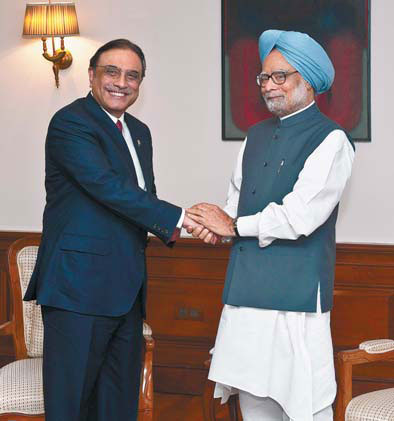Zardari makes rare trip to India
|
Pakistan President Asif Ali Zardari, left, shakes hands with Indian Prime Minister Manmohan Singh prior to their meeting at the latter's residence in New Delhi, India, on Sunday. Zardari arrived in India on a private trip early on Sunday. [Prakash Singh, Pool / Associated Press] |
President Asif Ali Zardari became the first Pakistani head of state since 2005 to visit India on Sunday for a one-day trip he described as "very fruitful" in improving ties between the rivals.
The leaders of India and Pakistan said they agreed in talks on Sunday that strained relations between their rival South Asian nations should be normalized.
Indian Prime Minister Manmohan Singh and Zardari said their meeting was friendly and constructive.
"Relations between India and Pakistan should become normal. That's our common desire," Singh told reporters after the private talks, at which no aides were present.
"We would like to have better relations," Zardari said.
Singh said he had accepted an invitation from Zardari to visit Pakistan, and "I'd be very happy to visit Pakistan at a mutually convenient date."
"We have a number of issues, but we are willing to find practical and pragmatic solutions to all those issues," Singh said. "That's the message President Zardari and I would like to convey."
Zardari arrived in India earlier Sunday on what was called a private religious trip that also gave him a chance to meet Indian leaders amid a thaw in relations between the two countries.
He was accompanied by about 25 family members, including his son, Bilawal Bhutto Zardari, who has been anointed his political heir.
He planned later on Sunday to visit Ajmer Sharif, a revered Muslim shrine in India's western state of Rajasthan.
Every day, thousands of believers visit Ajmer Sharif, a shrine to Sufi Muslim saint Moinudin Chishti 350 kilometers southwest of Delhi.
Zardari's visit to India, the first by a Pakistani head of state in seven years, is the most visible sign that the two countries have put behind them the enmity that followed the 2008 terror attack in the Indian city of Mumbai, in which 10 Pakistani terrorists killed 166 people in India's financial capital.
Officials said Singh would raise India's concerns about security and insist that Pakistan show its seriousness about reining in terrorist groups that were behind the Mumbai attack. India has blamed the Lashkar-e-Taiba militant group and demanded that Islamabad crack down on them.
This past week, United States slapped a $10 million bounty on Hafiz Mohammad Saeed, the group's founder, who operates openly in Pakistan.
Although no major breakthroughs were expected at Sunday's meeting, analysts said it would help keep the momentum going in a dialogue process that began last year.
"This is a largely symbolic occasion and contentious subjects will be avoided," said Brahma Chellaney, an analyst at New Delhi's Center for Policy Research, of the meeting between the leaders.
Pakistan's foreign policy is seen by many observers as the preserve of the powerful military, and Chellaney suggested Zardari wielded little real power.
"You can't have substantive talks with someone who doesn't run anything," he said.
Trade between the two countries has jumped in recent years.
In 1996, India granted Pakistan "most preferred nation" trading status, while Pakistan last year agreed in principle to match the move. Pakistan announced that it was lifting trade restrictions on India and the two countries are working on easing visa restrictions on businesspeople.
But both sides remain far from resolving their conflict over the Himalayan region of Kashmir, which both claim.
AP-AFP



















